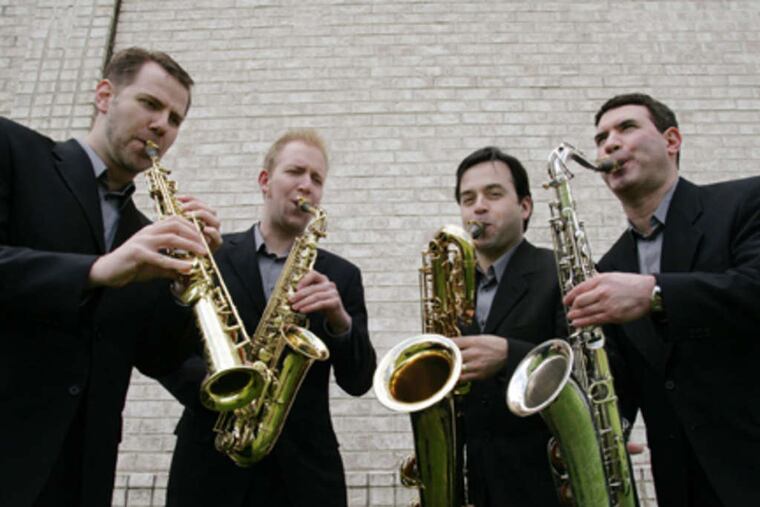What to expect from a sax quartet? Anything
Expectations are always best checked at the door with the Prism Quartet. But when a screen descended on the World Cafe Live stage on Friday, did anybody think the saxophone quartet's latest premiere would be heralded by a seemingly demented video rant by a man running for office in Ohio?

Expectations are always best checked at the door with the Prism Quartet.
But when a screen descended on the World Cafe Live stage on Friday, did anybody think the saxophone quartet's latest premiere would be heralded by a seemingly demented video rant by a man running for office in Ohio?
Composer Rudresh Mahanthappa amiably explained that one of those oddball YouTube videos-gone-viral - this one of GOP candidate Phil Davison, who's running for Stark County treasurer - helped him through the composing blocks he had while writing his new piece, titled I Will Not Apologize for My Tone Tonight.
If nothing else, the video's hysterical-to-poignant emotional range (you can have a look at www.youtube.com/watch?v=UhV5RgcNJjE) was ample preparation for a work combining Mahanthappa's taste for high-energy rhythm and South Indian classical music. His tone (considered abrasive by some) needed no apology.
The concert was the first installment in Heritage/Evolution, a three-concert series at both World Cafe Live (also May 8 and June 11) and New York City's Symphony Space (also May 9 and June 12; first concert was Saturday) in which the group consciously crosses boundaries from its usual classical terrain into cutting-edge jazz and world music.
Comfort zones weren't in the cards in the program's other premiere, Steve Lehman's 15 Places at the Same Time: It was full of searching solo passages featuring the unimposing but determined composer, who performed as guest saxophonist and described each movement as a way of "transforming and exploding" the way he typically makes music.
"It's some of the hardest stuff we've ever seen," Prism member Timothy McAllister said. "And we've seen it all."
That's no overstatement. It's hard to believe that Prism's 30th anniversary is this year, since many U.S. saxophone quartets (of which there are perhaps 10 fully professional ones) tend to be a short-term grad-school thing. And already, Prism is planning three years in advance with individual new pieces as well as larger-concept endeavors.
"Many foundations are interested in the excellence of the concept. There's even a term, conceptual virtuosity, that's been floating around," said Matthew Levy, 50, who is the only original member and has helped maintain momentum thanks to the savvy that comes with having run the music program of the Pew Center for Arts and Heritage from 2000 to 2011. No surprise that Prism is a nonprofit corporation with a three-member support staff.
The anniversary falls during a particularly good time for the quartet. Its best-known current member is McAllister, 41, who is the center of what's probably the most mainstream classical saxophone disc of the decade - John Adams' City Noir and Saxophone Concerto on Nonesuch. Prism's two Innova-label discs include one devoted to Levy's own music, and The Singing Gobi Desert, which features Chinese composers such as Bright Sheng and reflects a foray into China as part of the Beijing Modern Music Festival last summer.
Collaborations with Chinese instruments were surprisingly effortless. "The only negative was the air pollution" that made performances challenging, Levy said.
Still, the saxophone quartet continues to be an underdog ensemble. Teaching commitments mean the members - the others are Zachary Shemon, 30, and Taimur Sullivan, 44 - don't have the luxury of living in the same city (Levy is the only Philadelphian), and recently had to rehearse by Skype. While string quartets are booked year after year by presenters, Prism can hope to return only every three years or so. The current series at World Cafe Life is self-presented with support from Pew.
As much as the venue offered a congenial club atmosphere, ice-sloshing noises from the bar accompanied quiet parts of Friday's concert. Prism has yet to find an ideal performance spot.
Yet the audience, even amid the most brain-twisting repertoire, seemed spellbound, surprising Prism as much as anybody. Said Sullivan, "And that was a new audience for us."